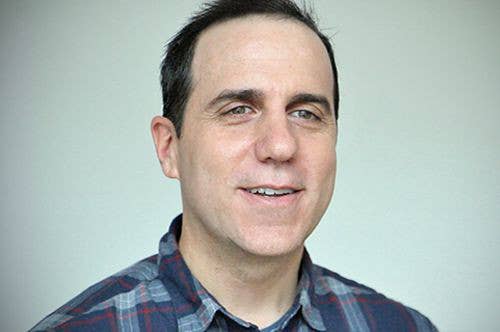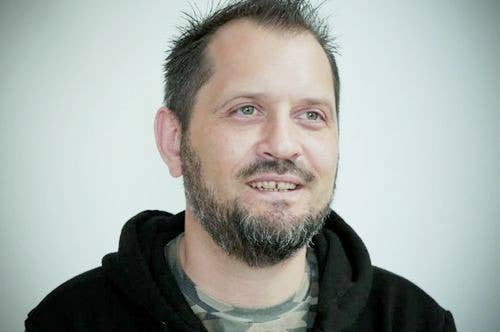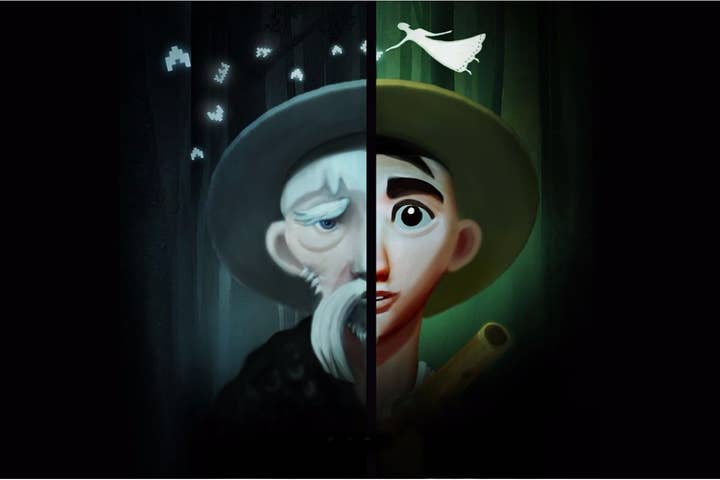Colabee Studios: Taking on the World
With their new studio, Never Alone's creative leads want to turn "world games" into a sustainable business
It wasn't supposed to happen. Sean Vesce and Dima Veryovka had both fashioned successful careers in AAA development; Vesce at Activision and Crystal Dynamics, Veryovka at Zipper Interactive and Sony Computer Entertainment. The games they worked on were epic feats of production, defined by scale, scope and, more often than not, lashings of the old ultraviolence. When Vesce resigned as studio director at Crystal Dynamics in 2009, he had just shipped Tomb Raider: Underworld. When Veryovka left Sony in 2012, he'd invested years in M.A.G. and SOCOM 4.
"We were both looking for ways to find meaning in our work. Part of it was born out of a dissatisfaction with the development process itself"
"We were both looking for ways to find meaning in our work, and use the craft of videogames in a way that was more positive than what we'd been doing," Vesce says when we meet at Casual Connect USA. "Part of it was born out of a dissatisfaction with the development process itself. Was there a way to make games where we could actually get out of the office? A way to get into communities and learn about the world?"
That opportunity arrived in what Vesce describes as a moment of "serendipity." He had been hired to start a development studio in Seattle for E-Line Media, a New York-based publisher of "game-based learning products." E-Line had a multi-layered strategy, but the aspect that intrigued Vesce the most was the notion of creating games based on the folklore and traditions of different world cultures. By the time Veryovka joined the studio as art director in 2012, Vesce was already in contact with the Cook Inlet Tribal Council (CITC), a group dedicated to representing and helping the indigenous peoples of south central Alaska.

"They were contemplating making a game but they really wanted some expert advice," Vesce says. E-Line did a "landscape analysis" for the CITC and drew an obvious conclusion. "We tried to dissuade them from making a game. It was a highly competitive industry that was a money suck for many people. You needed to be really serious if you wanted to do this."
The CITC's intentions were nothing if not serious. The proposed game was an attempt to motivate disaffected youth in Alaska, a group for which drug abuse, unemployment and suicide are major issues. E-Line's brief was to use native history and culture as a source of inspiration; to undermine the stereotypes, to empower and inspire. The result of that collaboration, Never Alone, was a commercial success in markets throughout the world, and was named Best Debut Game at the BAFTA awards last year.
"That always was the goal, right? That it would be commercially viable," says Veryovka. "From day one it was very clear we're not here just to make something special. We also should have a viable business model to make more games - a sustainable business."
"Look at the Never Alone numbers... It returned the money and it's generating more"
It's an important point, and one that is often lost when discussing projects with such altruistic values. For Never Alone to truly fulfil its objective, it had to be talked about, written about, and played by as many people as possible. E-Line succeeded admirably in each of these areas, without compromising the message at the heart of the game. For most publishers, the project would have been dismissed as a commercial risk. Never Alone offered compelling evidence that an audience existed for a very different kind of game.
"Look at the Never Alone numbers," Veryovka says. "It's a game about culture that's got bigger goals, meaningful goals, but at the same time it's successful. It returned the money and it's generating more. Unfortunately, we don't know many examples that actually did the same thing."
With that realisation, Colabee Studios was born. Named for the close "symmetrical relationship" required to make Never Alone - in which, as Vesce puts it, "we became students of their culture and we could become teachers of the game culture" - Vesce and Veryovka's new studio will seek to address the shortfall of meaningful games with a real chance at meaningful success.

"After having that experience, this was the only thing we wanted to focus on," Vesce says. "World games."
The big question, then, was where in the world to head next, and, strangely enough, the answer arrived in the form of another question. Following a talk on the making of Never Alone at GDC, Veryovka was approached by a developer from Ukraine, his own native country. "He said, 'You made such a beautiful game about the Alaskan native culture. Did you ever think about making a game about Ukrainian culture? You would be the perfect person. Make us proud to be who we are.'"
It was March 2015, and if you'd seen a news story about Ukraine in the previous 18 months it was probably about violent protests, revolution or the escalating conflict with Russia. Never Alone addressed a set of contemporary problems, and Veryovka recognised an opportunity to do the same for his homeland. "People trying to find their identity, fighting for their freedom, independence - that's what the perfect product would be," he says. "Let's go and find out what they're fighting for.
"People trying to find their identity, fighting for their freedom, independence - that's what the perfect product would be"
"Look at me: I'm Ukrainian, and I never speak Ukrainian. I always speak Russian, because where I grew up is a Russian speaking area. A lot of friends of mine are starting to learn the [Ukrainian] language, starting to reconnect because they don't want to be associated with Russian culture. That's the way of thinking: 'that's for Russian people, and they want to take our land.'
"The game is a way of reconnecting; for people from outside of the culture just to learn, but for people within the culture it will be for the sense of pride. 'Oh, that's ours.'"
Vesce immediately saw the potential. Veryovka being Ukrainian guaranteed "personal love and passion," but it also offered something else: access. Never Alone involved a huge amount of research and the direct assistance of "cultural advisors" that had approached E-Line in that moment of serendipity. Making contacts in an unfamiliar culture and gaining their trust would take time, but Veryovka allowed Colabee to quickly form relationships with institutions like the National University of Kiev. "They invited us to a two week cultural expedition," he says. "Going there, interviewing people, getting all these ideas."
Colabee's next game will be Forest Song, based on the play "Lisova Pisnya" by the writer Lesya Ukrainka. In Ukraine, Veryovka says, children study Lisova Pisnya at school, but despite Ukrainka's image adorning one of the country's banknotes, her work remains virtually unknown elsewhere in the world. Anyone who has played Never Alone, though, will find some familiar ideas in Forest Song. "It's these stories about what happens if people disrespect nature, showing the consequences," Veryovka says. "If you cut the tree there will be consequences. This story just brings it in a more dramatic, interesting way, with lots of spirits."
"We're hoping that games like this show a path to others, that this could be something much larger"
For Vesce, finding these connections between different cultures is one of the most rewarding aspects of this new approach to game development. "Like, what would Ukraine have to do with Alaskan native culture? But in fact there are these underlying values which kind of connect us all. Game development tends to be insular and self-referential. A lot of times it's very much about the game designer, my vision, but this is something completely different.
"For us it's a miracle to be able to find the methods to actually be able to do this, because you look around at the type of games that are out and right now and it's a tiny, tiny sliver. We're hoping that games like this show a path to others, that this could be something much larger."
If Colabee can strike a similar nerve to Never Alone with Forest Song, it could lead to a succession of games that Vesce refers to as a "storyteller series." Indeed, the process of building relationships with other cultures has already started, with a goal of shrinking the gap between the launch of Forest Song and pre-production on the studio's next game.
"We're self-funded at the moment," Vesce says. "We're pitching to traditional publishers, but we're having better luck - as we did with Never Alone - in attracting cultural partners. People within these cultures who have money, who are looking to get a return but also are aligned with our values. They want to see these games exist as much as we do."
GamesIndustry.biz is a media partner for the Casual Connect conference. Our travel and accommodation costs were provided by the organiser.









